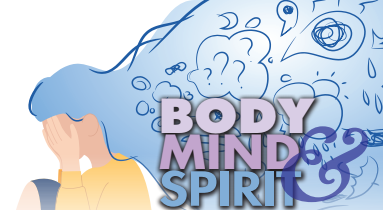Why We Avoid Routine Medical Examinations
By MARY JOYE, LMHC
Most of us do it, or rather don’t do it when it comes to scheduling routine medical screenings or examinations. Who really wants a mammogram, colonoscopy or other unpleasant procedures? We procrastinate though we are told and scolded by the media and experts that waiting too long can be catastrophic, but we ignore the warning. We all are aware, if you “catch” something early, a better prognosis may be likely. Yet we avoid the diagnosis like a child fighting brushing their teeth. There may be something to our childhood imprinting.
An ounce of prevention is worth a pound of cure, but a little bit of fear goes a long way, too. Resisting examinations when you feel perfectly healthy makes sense to those in healthcare professions. They know if you have a family history of medical concerns may repeat itself genetically. A few women in my family had breast cancer and I had a scare with benign tumors, and yet have put off mammograms before but not now. They are painful and embarrassing but necessary and it requires discipline to care for yourself.
“Why Do People Avoid Medical Care? A Qualitative Study Using National Data,” by Jennifer Taber, PhD of The National Cancer Institute, et al found some culprits of our stalling behaviors.
- Discomfort of medical examinations.
- Lack of funding or insurance to afford care.
- Fear of having a serious illness and wishing to avoid knowing.
- Time to self-care. (This is why many caregivers pass away before the person they are caring for does.)
- Perception the illness will improve.
- Only will go if they feel sick “enough.”
An interesting question left open for discussion the researchers may have underestimated is how some participants associated doctors with death. This was an unexpected revelation as doctors are trained to save lives; yet people some view them as only necessary when their healthcare attempts were unmanageable.
The same is true of mental health care. If people have tools to deal with stress before trauma or tragedy occurs, it could prevent serious mental health complications. In practice, most mental health care providers don’t see someone until their lives have become unmanageable from layers of unresolved issues or difficult childhoods swept under the subconscious rugs in their brain, but the memory centers and childhood programming are operating even when we may not be aware. We can prevent mental breakdowns with check-ins so we don’t build up repressed emotional events thinking time makes them less important. That’s the “stuff” PTSD is made of and can be treated. If you don’t deal with mental health issues early, they may deal with you later. Being conscious of how your subconscious drives you is crucial to maintaining health and wholeness without being “infected” by the past infiltrating your present.
This is another reason we hate going to the doctor. As children, going to the doctor was scary. We remember the personal prodding, shots, stitches and whatever else we endured. No cute toys in the office or lollipops can override the negative memory from forming future resistance. However, when you access your inner adult, you see that going to the doctor, whether for a mammogram or other test, could put your mind to rest, too. Retrain your brain and know, it’s just a test, it is only a test. Taking care of ourselves better equips us to care for our loved ones and to enjoy life to the fullest.
